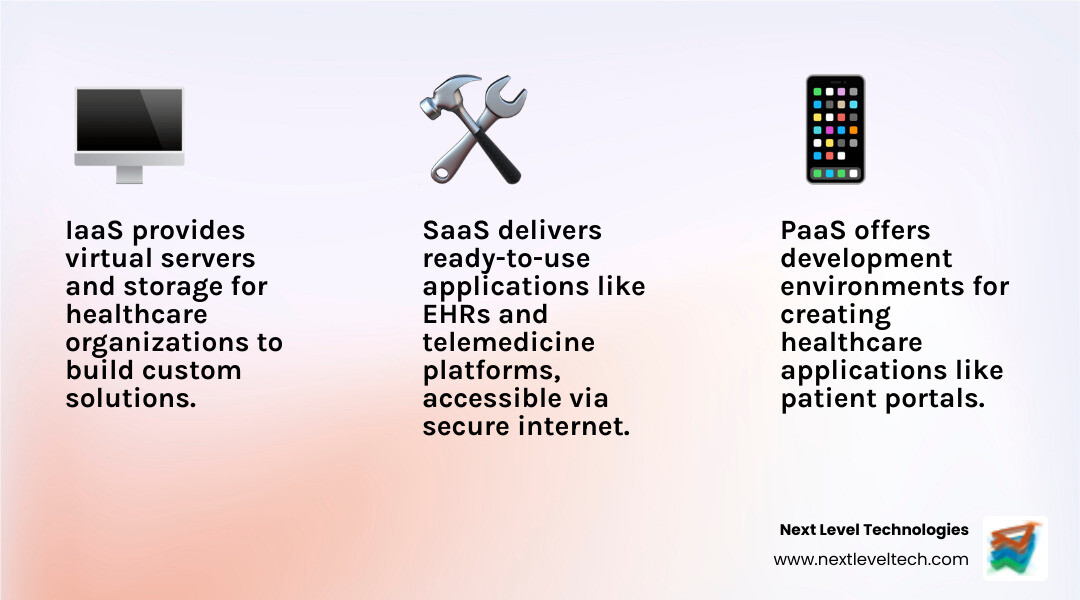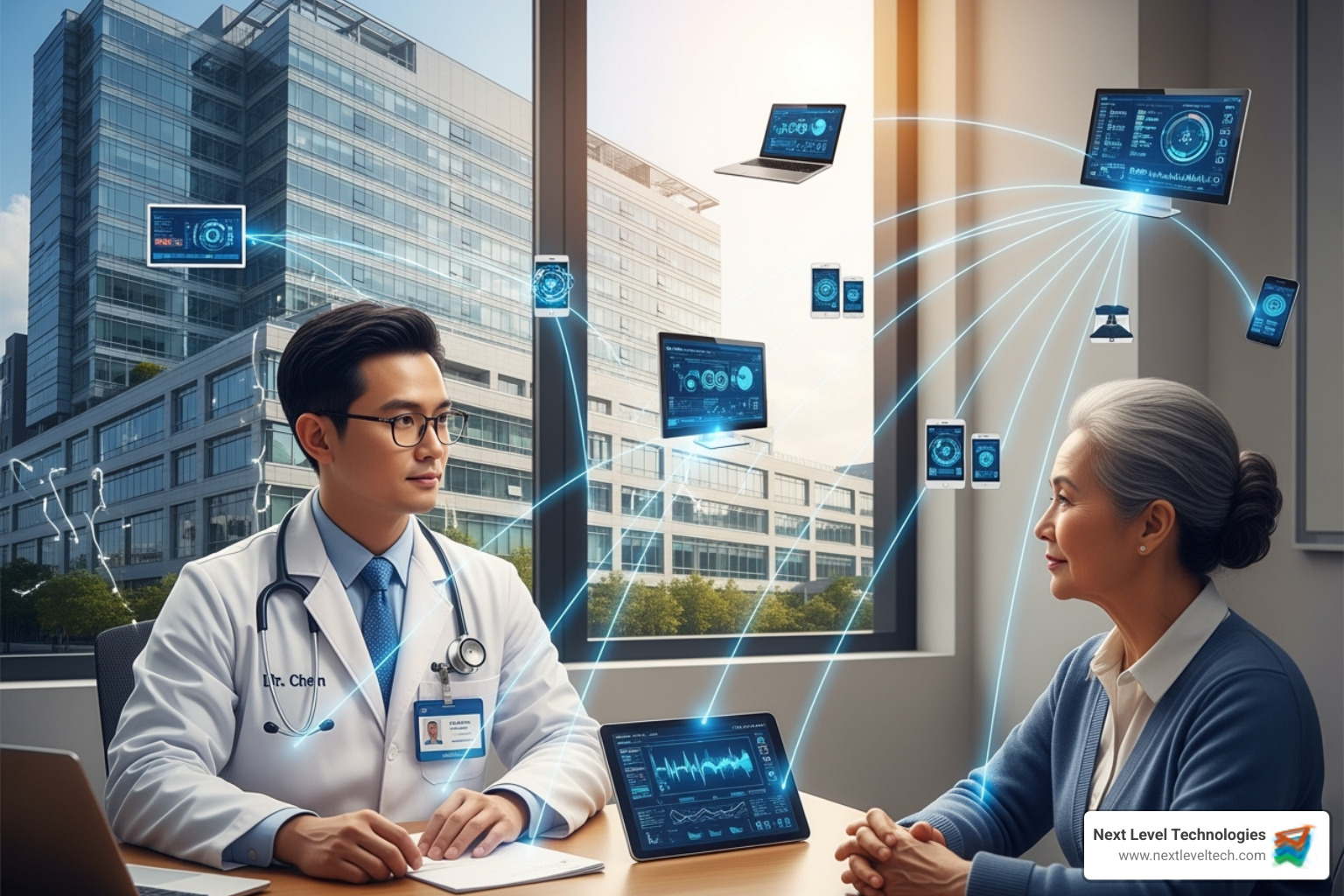Healing in the Cloud: A Comprehensive Guide to Healthcare Computing
November 19, 2025

Transform your IT! Discover how proactive IT support prevents issues, cuts costs, and secures your business for growth.
February 21, 2026

Discover the benefits of incident management to minimize costly downtime, boost customer trust, and ensure business continuity.
February 19, 2026

Elevate your business with proactive IT Support Charleston WV. Secure, cloud-powered solutions & local expertise for seamless operations.
February 18, 2026
November 19, 2025
Cloud computing healthcare is revolutionizing how medical organizations store, access, and analyze patient data. Here's a brief overview:
What is Cloud Computing in Healthcare?
Key Benefits:
The healthcare industry is undergoing an unprecedented digital change. Hospitals now generate petabytes of data every year, with that volume increasing by roughly one-third annually. The global market for cloud computing in healthcare reflects this, and is expected to triple from approximately $70 billion in 2024 to more than $210 billion by 2033. With 70-80% of U.S. health systems already using cloud services, traditional on-premise systems simply can't keep pace.
Cloud computing isn't just about remote storage; it's about fundamentally changing operations. One health system reduced data query times from 15-20 minutes to just 15-20 seconds after migrating to the cloud—a critical difference when a clinician needs instant access to patient information. This shift addresses the challenge of outdated infrastructure, offering a path forward that improves security, reduces costs, and enables the advanced technologies shaping the future of medicine.
As Steve Payerle, President of Next Level Technologies, I've spent over a decade helping healthcare organizations steer the complexities of cloud computing healthcare migration. My team and I, with our extensive cybersecurity training and technical expertise, understand that for providers in Columbus, Ohio, and Charleston, WV, this transition is a strategic imperative that directly impacts patient care and operational efficiency.

The shift toward cloud computing healthcare is a fundamental change in how medical organizations operate. Today, IT infrastructure is recognized as a critical enabler of patient care and operational excellence, and providers are finding their old systems can't keep up.
Healthcare operates on tight margins, and cloud computing directly addresses this. The most immediate benefit is reduced capital expenditure. Instead of buying expensive servers and hardware, organizations shift to a pay-as-you-go model, converting large upfront investments into predictable operational costs. This also leads to lower IT maintenance overhead, as the cloud provider manages the underlying infrastructure. Your in-house IT staff—often stretched thin—can then focus on strategic initiatives that improve patient outcomes rather than troubleshooting hardware.
Cloud-based workflows streamline administrative tasks, freeing up staff to spend more time with patients. With faster data query speeds, clinicians get the information they need instantly, which can be critical in a medical emergency. The cloud also delivers improved disaster recovery, automatically replicating data across multiple locations. For organizations in areas like Columbus, Ohio, and Charleston, WV, this provides invaluable peace of mind against unexpected events. Cloud computing allows you to focus on patient care, not IT management.
The biggest driver for cloud adoption is often the pain of existing legacy systems. This old infrastructure comes with high maintenance costs that drain resources from patient care. Perhaps more critically, these systems suffer from a lack of scalability. As healthcare data volumes explode, legacy systems buckle under the pressure, creating performance bottlenecks. In the cloud, scaling resources is often just a few clicks away.
Older systems also create data silos, preventing different departments from sharing information and fragmenting the patient view. Furthermore, they present significant security vulnerabilities in old hardware, making them prime targets for modern cyber threats. Finally, legacy infrastructure makes it difficult to integrate new technologies like AI and advanced analytics. At Next Level Technologies, we help healthcare organizations in Columbus and Charleston address these pain points, creating a modern, agile, and secure foundation for the future of medicine through cloud computing healthcare.
At Next Level Technologies, we've seen cloud computing healthcare transform fragmented systems into integrated, patient-centered data platforms. This shift addresses one of healthcare's most persistent challenges: getting the right information to the right people at the right time.

By centralizing data in a secure, accessible environment, healthcare organizations can break free from the limitations of siloed systems. Electronic Health Records (EHRs) become truly useful, combining lab results, imaging studies, and specialist notes into one cohesive view. Modern interoperability standards like FHIR (Fast Healthcare Interoperability Resources), supported by cloud platforms, ensure different systems can exchange data seamlessly. This makes real-time data access the norm, allowing a physician to instantly pull up a patient's complete medical history, even from another health system.
One size doesn't fit all in healthcare IT, which is why the flexibility of public, private, and hybrid cloud models is so important. Hybrid cloud solutions are particularly popular, offering a perfect balance between security and accessibility. Organizations can keep their most sensitive patient data on private, on-premise infrastructure while leveraging the public cloud's massive computing power for analytics, research, or less sensitive applications.
This approach allows for cost optimization and remarkable scalability. You can run predictable workloads on private infrastructure and burst to the public cloud during demand spikes, paying only for the extra resources you use. For our clients in Columbus, Ohio, and Charleston, WV, a phased migration strategy using a hybrid model is often the best approach. It allows for a gradual transition, minimizing disruption to patient care. Our team at Next Level Technologies brings extensive technical expertise and cybersecurity training to guide these projects, ensuring a successful and secure transition.
Breaking down data silos is one of the most impactful changes that cloud computing healthcare enables. By bringing structured data, unstructured notes, and medical imaging into a centralized environment, you create a unified data store that gives clinicians a complete patient picture.
This unified approach makes secure data sharing between providers straightforward, leading to vastly improved care coordination. When a patient's entire care team—from primary doctors to specialists and pharmacists—can access the same up-to-date information, the quality of care improves measurably. It also empowers patients with direct access to their own medical records through secure portals, helping them become active participants in their care. This makes the concept of a longitudinal patient record—a comprehensive view of a person's health journey—an achievable reality, supporting truly personalized care.
When we discuss cloud computing healthcare, security is the primary concern. The responsibility to protect patient data is enormous. However, with the right approach and expertise, the cloud can be more secure than the aging on-premise systems many facilities still use.

Moving to the cloud involves real security challenges. Healthcare is a prime target for data breaches and ransomware attacks due to the value of patient data. Other risks include insider threats (both accidental and malicious), misconfiguration of complex cloud services, and ensuring business associate compliance under HIPAA. Managing these risks across a hybrid or multicloud environment requires serious expertise and constant vigilance.
Fortunately, every challenge has a solution. At Next Level Technologies, our team's extensive cybersecurity training and technical experience are applied to protect our healthcare clients in Columbus, OH, and Charleston, WV.
It starts with the shared responsibility model: the cloud provider secures the infrastructure, while you are responsible for securing your data in the cloud. We help you manage your responsibilities with a multi-layered strategy:
Robust Technical Controls: We implement non-negotiable data encryption for information both in-transit and at-rest. We use granular identity and access management and a Zero Trust architecture, which assumes no user is trusted by default and verifies every access request.
Proactive Monitoring and Defense: We deploy advanced threat detection systems that continuously monitor for suspicious activity. We also conduct regular security audits and assessments, including penetration testing and vulnerability scans, to find and fix weaknesses before they can be exploited.
A People-Focused Approach: Technology is only part of the solution. We provide ongoing staff cybersecurity training to ensure your team is the first line of defense, not a vulnerability. Our experts educate your personnel on recognizing threats and handling data securely.
Compliance and Expert Partnership: HIPAA, HITECH, and GDPR compliance are built into everything we do. As an experienced IT provider that understands healthcare's unique needs, we act as a liaison between you and your vendors, steer complex regulations, and bring deep technical experience to every project. Partnering with a healthcare-savvy IT provider makes all the difference in achieving a secure, compliant cloud environment.
The true power of cloud computing healthcare lies in its ability to transform patient care. For healthcare leaders in Columbus, Ohio, and Charleston, WV, the cloud is the foundation for technologies that were once science fiction.

The COVID-19 pandemic accelerated the adoption of telemedicine, a shift made possible by the cloud. Scalable video conferencing platforms allow providers to expand virtual care on demand. Beyond video calls, the cloud enables Remote Patient Monitoring (RPM), where data from wearable devices flows to providers, allowing for proactive intervention before a crisis occurs.
These technologies are life-changing, especially for those in underserved areas. Expanding healthcare access to rural areas means patients can see specialists without long drives. The improved patient convenience of receiving quality care from home is a benefit for everyone, and all virtual visit records are securely stored as part of the patient's permanent health record.
The cloud's massive computing power is making entirely new medical approaches possible. Genomic data processing, which once took hours, can now be done in minutes, paving the way for personalized medicine. By analyzing millions of patient records, predictive analytics and machine learning algorithms can identify high-risk patients before symptoms appear.
This power also accelerates drug findy and enables faster medical research collaboration, as scientists worldwide can securely access shared datasets. The ultimate goal is personalized medicine at scale, where treatments are custom to an individual's genetic makeup, lifestyle, and medical history.
At Next Level Technologies, our team's extensive cybersecurity training and technical expertise ensure that as healthcare organizations adopt these advanced technologies, they do so securely. The integration of AI, machine learning, and cloud computing healthcare is fundamentally reimagining what's possible in medicine.
Adopting cloud technologies raises many questions. Having worked with numerous healthcare organizations in Columbus, OH, and Charleston, WV, we've compiled answers to the most common ones.
Cloud computing healthcare typically involves three service models that are often used in combination:
Yes—when implemented correctly, the cloud is often more secure than traditional on-premise systems. Major cloud providers invest billions in security infrastructure that most organizations can't match, including physical security, advanced encryption, and threat monitoring. Many are certified for HIPAA compliance.
However, security is a shared responsibility. The provider secures the cloud, but your organization is responsible for securing your data in the cloud. This involves proper configuration, access management, and internal policies. At Next Level Technologies, our team's extensive cybersecurity training and technical expertise are crucial for helping clients manage their side of this responsibility, ensuring patient data is encrypted and protected.
Cloud computing healthcare directly translates to better patient care in several key ways. It provides clinicians with faster access to a complete patient history, leading to more accurate diagnoses and better-informed decisions. By breaking down data silos, it enables better care coordination among different providers, reducing redundant tests and medication errors.
The cloud also powers advanced diagnostic tools, like AI-powered image analysis, that can detect diseases earlier. It has expanded access to care through telemedicine and remote patient monitoring, especially for rural or mobility-challenged patients. Finally, it supports personalized treatment plans by enabling the analysis of vast datasets, including genomic information, to create highly individualized care strategies.
Cloud computing healthcare is not just a trend—it's a fundamental shift reshaping how medical organizations operate and deliver care. From dramatic cost savings and operational efficiencies to breaking down data silos, the benefits are clear. The cloud is the engine for innovation, enabling everything from telemedicine and remote monitoring to AI-powered diagnostics and personalized medicine.
The future of healthcare is collaborative, connected, and cloud-powered. However, getting there requires careful planning, deep technical expertise, and an unwavering commitment to security and compliance.
For healthcare organizations in Columbus, Ohio, and Charleston, WV, partnering with the right IT provider is critical. At Next Level Technologies, our team brings extensive cybersecurity training and technical experience custom specifically to the healthcare industry. We understand HIPAA, know how to secure cloud environments, and are committed to ensuring your transition is smooth, secure, and aligned with your patient care goals.
We don't just manage IT—we become your partner in navigating this digital change, ensuring every step strengthens your ability to deliver exceptional patient care.
Ready to take your healthcare organization to the next level? Contact us to learn more about our managed IT services and find how we can help you harness the full power of cloud computing healthcare.
Transform your IT! Discover how proactive IT support prevents issues, cuts costs, and secures your business for growth.
February 21, 2026
Discover the benefits of incident management to minimize costly downtime, boost customer trust, and ensure business continuity.
February 19, 2026
Next Level Technologies was founded to provide a better alternative to traditional computer repair and ‘break/fix’ services. Headquartered in Columbus, Ohio since 2009, the company has been helping it’s clients transform their organizations through smart, efficient, and surprisingly cost-effective IT solutions.
